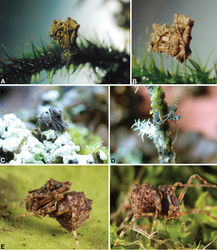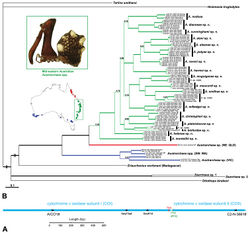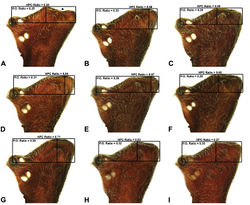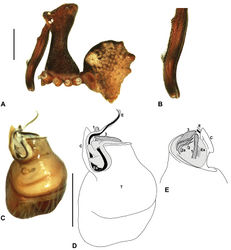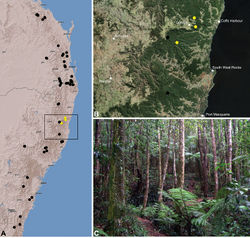Austrarchaea christopheri
| Notice: | This page is derived from the original publication listed below, whose author(s) should always be credited. Further contributors may edit and improve the content of this page and, consequently, need to be credited as well (see page history). Any assessment of factual correctness requires a careful review of the original article as well as of subsequent contributions.
If you are uncertain whether your planned contribution is correct or not, we suggest that you use the associated discussion page instead of editing the page directly. This page should be cited as follows (rationale):
Citation formats to copy and paste
BibTeX: @article{Rix2011ZooKeys123, RIS/ Endnote: TY - JOUR Wikipedia/ Citizendium: <ref name="Rix2011ZooKeys123">{{Citation See also the citation download page at the journal. |
Ordo: Araneae
Familia: Archaeidae
Genus: Austrarchaea
Name
Austrarchaea christopheri Rix & Harvey sp. n. – Wikispecies link – ZooBank link – Pensoft Profile
Type material
Holotype male: Dorrigo National Park, Rosewood Creek Circuit track from The Never Never Picnic Area, New South Wales, Australia, 30°21'42"S, 152°47'55"E, sifting elevated leaf litter, subtropical rainforest, 1092 m, 17.IV.2010, M. Rix, D. Harms (AMS KS114968DNA: Ar49-95-M).
Paratypes: 2 males and 4 juveniles, same data as holotype (WAM T112554DNA: Ar49-96-J/Ar49-97-J).
Other material examined
AUSTRALIA: New South Wales: Dorrigo National Park: The Never Never, III.–12.XI.1980, G. Monteith, 1♂ (QMB S30806). Cascades National Park: off Briggsvale Road, N. of Megan, 30°15'11"S, 152°46'52"E, sifting elevated leaf litter, subtropical rainforest, 848 m, 17.IV.2010, M. Rix, D. Harms, 3 juveniles (WAM T112553DNA: Ar50-98-J/Ar50-99-J/Ar50-100-J). New England National Park: “Oakes State Forest", Horseshoe Road, ~1.2 km S. of Killiekrankie Mountain, 30°33'10"S, 152°32'15"E, pitfall trap, 11-24.XI.1999, M. Gray, G. Milledge, H. Smith, 1♂ (AMS KS61544).
Etymology
The specific epithet is a patronym in honour of Christopher Rix, for his close association with the Dorrigo region, and for his great achievements, both personal and professional.
Diagnosis
Austrarchaea christopheri can be distinguished from all other Archaeidae from mid-eastern Australia by the very long, uniquely rod-like tegular sclerite 1 (TS 1) (Figs 20D-E).
This species can also be distinguished from other genotyped taxa from mid-eastern Australia (see Fig. 3B) by the following four unique nucleotide substitutions for COI and COII (n = 6): A(63), C(801), A(1070), G(1332).
Description
Holotype male: Total length 3.17; leg I femur 2.96; F1/CL ratio 2.57. Cephalothorax dark reddish-brown; legs tan-brown with darker annulations; abdomen mottled grey-brown and beige, with darker reddish-brown dorsal scute and sclerites (Fig. 20A). Carapace tall (CH/CL ratio 2.10); 1.15 long, 2.42 high, 1.08 wide; ‘neck’ 0.54 wide; bearing two pairs of rudimentary horns; highest point of pars cephalica (HPC) near posterior margin of ‘head’ (ratio of HPC to post-ocular length 0.86), carapace gently sloping and almost horizontal anterior to HPC; ‘head’ moderately elevated postero-dorsally (post-ocular ratio 0.33) (Fig. 9B). Chelicerae with brush of accessory setae on anterior face of paturon (Fig. 20B). Abdomen 1.64 long, 1.17 wide; with three pairs of dorsal hump-like tubercles (HT 1–6); dorsal scute fused anteriorly to epigastric sclerites, extending posteriorly to first pair of hump-like tubercles; HT 3–6 each covered by separate dorsal sclerites. Unexpanded pedipalp (Figs 20C-E) with thin, broadly-tapered foliate conductor; tegular sclerite 1 (TS 1) very long, rod-like, reaching to near distal tip of conductor, visible in retrolateral view; TS 2 spur-like, shorter than TS 1; TS 2a sinuous, filiform, exposed distally; TS 3 embedded proximally within distal haematodocha, with prominent, pointed apex projecting beyond retro-distal rim of tegulum.
Female: Unknown.
Variation: Males (n=5): total length 2.72–3.23; carapace length 1.09–1.15; carapace height 2.31–2.46; CH/CL ratio 2.07–2.18.
Distribution and habitat
Austrarchaea christopheri is known from rainforest habitats throughout the Dorrigo and New England hinterland of north-eastern New South Wales (west and south-west of Coffs Harbour), in the Dorrigo, Cascades and New England National Parks (Fig. 38).
Conservation status
This species has a relatively widespread distribution in several National Parks protected under World Heritage legislation, and is not considered to be of conservation concern.
Original Description
- Rix, M; Harvey, M; 2011: Australian Assassins, Part I: A review of the Assassin Spiders (Araneae, Archaeidae) of mid-eastern Australia ZooKeys, 123: 1-100. doi
Images
|
